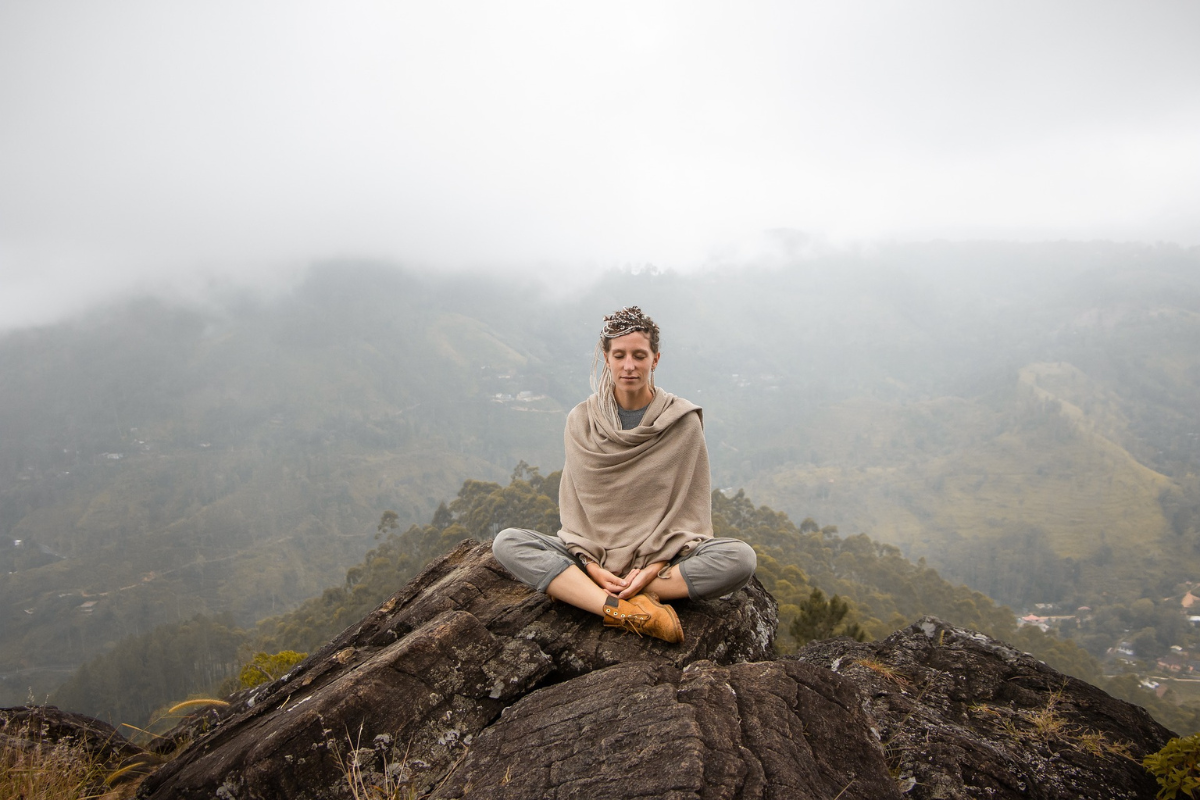Journey to higher consciousness is often marked by profound experiences and revelations leading many individuals to state of spiritual awakening. This awakening can transform your perspective on life. You can connect deeply with yourself and universe around you. Understanding this path involves recognizing its stages. You also learn how you can navigate through them for personal growth and self-discovery.
One of the first signs of spiritual awakening is sense of discontentment with the status quo. You may find that material possessions and societal success do not bring fulfillment you once expected. Instead, a yearning for deeper meaning surfaces. During this period many feel isolated. Or they feel disconnected from their environment, which can feel overwhelming. However this sense of discontent is often a catalyst for exploration and change.
As you begin to seek answers introspection becomes essential. Engaging in mindfulness practices such as meditation or journaling, can help clarify thoughts and feelings. These practices ground you. They open pathways to higher awareness. Many individuals report early stages of this journey evoke intense emotions. Sometimes resulting in mood swings or existential crises. Embrace these feelings; they often signal deep healing and transformation.
During the self-reflective phase you may also encounter synchronicities—meaningful coincidences that seem to guide you along your journey. These moments can appear as serendipitous events. They feel orchestrated by higher power. By paying attention to these signs you may find additional motivation to follow intuition and align actions with your inner voice.
Here’s simplified journey map displaying common stages of spiritual awakening:
Feeling unfulfilled? Try self-reflection and mindfulness. Simple practices like nature walks, daily journaling, and mindful breathing can ease anxiety and boost well-being. Explore mindfulness literature and model these practices for your kids. Schools with mindfulness programs often see improved student focus and care. Incorporate gratitude, kindness, and community service to enhance your outlook. Find what works best for you, whether it’s meditation, music, or art. Remember, mindfulness is a journey that requires patience but offers significant personal growth and well-being.
| Stage | Description |
|---|---|
| 1. Discontentment | |
| 2. Introspection | |
| 3. Synchronicities | Noticing significant coincidences that guide your path |
| 4. Inner Transformation | Experiencing shifts in values beliefs and priorities. |
| 5. Higher Connection | Feeling deeper connection with universe. And others. |
As you continue on this path your values and beliefs may undergo fundamental shift. The concept of “inner transformation” becomes vital at this stage. Many individuals begin to question societal norms. These people find deeper meaning in simpler, more authentic activities. Volunteer work often brings immense joy. Nature exploration and artistic pursuits also provide satisfaction. Allowing yourself to grow through these experiences nurtures your spirit and expands your consciousness.
Furthermore as you develop relationship with your higher self, you may notice increased capacity for empathy and compassion. Engaging with others from this elevated state can result in deeper relationships. This leads to a sense of community. The realization that everyone is on unique journey fosters broader understanding. It also encourages acceptance of different perspectives.
However spiritual journey is not without its challenges. Doubts and fears may arise. Particularly as you confront deeper truths about yourself and the world. It’s essential to approach these challenges with patience and the knowledge that they are part of growth process. Surrounding yourself with supportive individuals and engaging in spiritual communities can facilitate healing during tough times.
Ultimately, spiritual awakening serves as pathway to higher consciousness and self-growth. It invites you to cultivate deeper understanding of yourself. Encouraging authenticity and intentional living. Embrace journey with an open heart. Remain receptive to the lessons and growth that arise along the way. By doing so you not only elevate your consciousness but also contribute positively to the collective consciousness of humanity.
This journey is about self-discovery transformation and elevation. As you actively participate in your spiritual awakening. You’ll come to appreciate the beauty in both the struggles and triumphs. Remember, every step you take brings you closer to higher state of awareness and consciousness.

The Role of Meditation in Self-Growth and Spiritual Development
Meditation has emerged as pivotal practice for self-growth and spiritual development. In an increasingly fast-paced world meditation fosters deeper connection with oneself. It offers a pathway to heightened self-awareness. Emotional intelligence and personal transformation follow. Each individual’s journey within this practice can vary. However, the core benefits remain universally relevant.
One of foundational elements of meditation is mindfulness. Mindfulness encourages individuals to focus on present moment. Cultivating a sense of awareness that can lead to profound internal insights. This heightened awareness allows people to observe their thoughts and feelings without judgment. Paving the way for healthier responses to life’s challenges. Research shows that consistent mindfulness practice can significantly reduce stress and improve mental clarity. Which is vital for self-growth.
Meditation into daily life doesn’t require extensive time commitments. Many find success with just a few minutes each day. For beginners starting with short sessions of about five to ten minutes can yield noticeable benefits. Over time, as comfort grows. Extending meditation periods can lead to deeper exploration into one’s psyche. Here’s simple table illustrating beginner meditation techniques
Concentrating on Focusing on a single point, like your breath, and using imagery can greatly enhance mental well-being. Visualization techniques allow you to mentally escape to calming places, such as a serene beach with gentle waves, which can lower stress and improve your mood. Effective imagery involves vividly imagining sights, sounds, and sensations, but it does require practice and consistency. For beginners, guided imagery sessions available on various digital platforms can be very helpful. While imagery techniques are not a replacement for professional therapy, they can complement your overall mental health strategy and reinforce positive mental states.
| Technique | Description | Duration |
|---|---|---|
| Focused Attention | 5-10 minutes | |
| Body Scan | Bringing awareness to different parts of body. | 10-15 minutes |
| Guided Visualization | 15-20 minutes |
Another crucial aspect of meditation is its role in developing emotional resilience. As individuals gain insight into their emotions they learn to navigate their responses more skillfully. Instead of reacting impulsively to triggers. Meditation helps cultivate a space of pause where thoughtful responses can flourish. This shift not only enhances interpersonal relationships but also fosters inner strength that can handle life’s unpredictability with grace.
As individuals embark on their spiritual journey meditation acts as tool for exploring the self at deeper levels. Many practitioners report experiencing moments of clarity or profound realization during meditation. These moments can illuminate one’s purpose in life. Leading to more profound self-growth. Regular practice encourages a deepening understanding of one’s beliefs and values. Aligning actions more closely with personal truths.
Furthermore, varied forms of meditation offer different pathways to spiritual development. Here are some popular styles and their benefits
- Transcendental Meditation: Involves silently repeating mantra to settle into deeper state of awareness.
- Zen Meditation (Zazen): Focuses on seated meditation. Develops insight into the nature of existence.
- Loving-Kindness Meditation (Metta): Emphasizes compassion. Loving thoughts towards oneself and others.
For many journey toward higher consciousness is sparked by disciplined practice of meditation. By creating a regular space for mindfulness, individuals often find clearer path to connecting with their spirituality. This connection can reveal insights. These insights help in navigating life’s complexities with a sense of clarity and purpose.
Moreover the benefits of meditation extend beyond individual transformation. As one grows in self-awareness and emotional intelligence, ripple effect occurs. This fostering more compassionate interactions with others. This interconnectedness enhances community ties and develops a collective consciousness that values empathy and understanding.
The essence of meditation in self-growth and spiritual development lies in its capacity to quiet the noise of daily life. By embracing this practice individuals can peel back the layers of societal conditioning. This helps uncover their authentic selves. This journey, although deeply personal ultimately leads to broader understanding of one’s place in the universe.
To best harness power of meditation it’s essential to approach it with an open heart and sense of curiosity. By viewing each meditation session as an opportunity for growth rather than a chore. Individuals can transform their lives progressively and profoundly. The path may not always be straightforward. But with persistent dedication, rewards of self-growth and spiritual development through meditation can be extraordinary.
Signs of Spiritual Awakening: How to Recognize Your Path
Experiencing a spiritual awakening can feel like profound shift in life. Guiding you toward higher consciousness and self-growth. Many people might not recognize signs of such transformation. Yet understanding these indicators can illuminate your journey.
Heightened Awareness
One of the most noticeable signs is heightened awareness of self and surroundings. You may find yourself more attuned to your emotions and thoughts. The energies around you. This new level of consciousness allows for deeper connections with others. A greater appreciation of beauty in nature. Embrace this phase by practicing mindfulness. This can enhance your sensitivity to the present moment.
Changes in Relationships
Another significant sign of spiritual awakening is shift in your relationships. You might gravitate towards more genuine connections. Leaving behind those that no longer serve you. Similarly old friends or family members might feel distant as your values and priorities begin to evolve. This isn’t necessarily a negative aspect. It’s part of aligning yourself with like-minded individuals who encourage your self-growth.
Deep Inner Reflections
As you awaken spiritually you may feel strong urge to reflect on your life and past experiences. This internal dialogue can expose old wounds. You may find it brings unresolved issues to surface, prompting you to confront them. Journaling is helpful tool during this time. It allows you to articulate your thoughts and emotions clearly. Consider asking yourself insightful questions like “What am I grateful for” or “What lessons can I take from my past?”
Intuitive Guidance
You might also start experiencing heightened intuition. This can manifest as sudden insights or gut feeling that guides your decisions. Trusting your instincts becomes essential during this phase. Your inner self is often more aligned with your higher consciousness. To strengthen intuition try meditative practices that encourage a peaceful state of mind. This allows you to listen to your inner voice.
Physical Sensations and Changes
Physical changes can accompany your spiritual awakening. These may include unusual sensations in your body. Like tingling or feeling of lightness. Some individuals report changes in sleep patterns or diet preferences. It’s essential to listen to your body and nourish it appropriately during this transition. Keeping health journal might help you track these changes and understand how they connect with your spiritual journey.
Seeking Deeper Meaning
During this time you may find yourself questioning meaning of life. Many people feel sudden urge to explore philosophies. They delve into religions or spiritual teachings that resonate with them. Reading books can be incredibly beneficial. Attending workshops or joining spiritual communities is also helpful. Engaging with other seekers broadens your perspective. You hear others’ experiences and fuel your personal growth.
Emotional Rollercoaster
One of more challenging aspects of spiritual awakening is emotional rollercoaster it can bring. You might feel surge of emotions. From bliss and joy to sadness and anger. This fluctuation is normal. But can be overwhelming. Practicing emotional regulation techniques like meditation or breathing exercises can help you manage these feelings. Remember it’s all part of your transformative journey.
New Interests and Passions
As you delve deeper into your spiritual path you might discover new interests or passions that previously went unnoticed. Whether it’s art, writing or alternative healing practices. Exploring these new avenues can expand your understanding of yourself and world around you. Make a commitment to engage in activities that inspire you. They often provide clarity and joy during this process of self-discovery.
Feeling a Sense of Oneness
As your spiritual journey progresses many individuals report profound sense of oneness with universe and people around them. This feeling can be humbling. It’s also exhilarating. It reinforces belief that we are all interconnected. Embrace sense of unity by participating in acts of kindness. Compassion can further enrich your spiritual experience.
Recognizing signs of spiritual awakening is essential for navigating your journey towards higher consciousness and self-growth. By being attuned to these indicators you can embrace transformative experience with an open heart and mind. Remember, the path may be winding it may be challenging. But every step brings you closer to your true self.
Overcoming Obstacles on Journey to Higher Consciousness
The journey toward higher consciousness is profound. Yet it often comes with various challenges. These can hinder personal growth. Many individuals seeking spiritual awakening may encounter obstacles that threaten to derail their progress. Understanding these obstacles is first step in overcoming them and moving towards a more enlightened self. This article explores common hurdles on path to higher consciousness and offers strategies to overcome them.
Fear of Change
One of most significant obstacles many face is fear of change. Transitioning to higher state of consciousness demands stepping outside of comfort zones. This can be intimidating. It’s essential to recognize that change is natural part of growth. Embracing small changes gradually can lessen anxiety. The anxiety that accompanies larger transformations.
Strategies to Overcome Fear of Change
- Understand Your Fears: Journaling about fears can provide clarity. Writing things down often helps make abstract worries feel more manageable.
- Visualize Success: Spend time imagining positive outcomes of embracing change. Visualization can create a mental picture that counters negative feelings.
- Seek Support: Surround yourself with like-minded individuals who encourage growth. A supportive community can help ease transition.
Self-Doubt and Limiting Beliefs
Many individuals struggle with self-doubt and limiting beliefs that stem from past experiences or societal expectations. These negative thoughts can trap you in cycle of stagnation. This makes it difficult to progress on your spiritual journey. Identifying these beliefs is crucial for personal growth.
Strategies to Combat Self-Doubt
- Affirmations: Regularly practicing positive affirmations can counter self-deprecating thoughts. Repeating phrases like “I am worthy of growth” can shift your mindset
- Challenge Negative Thoughts: When self-doubt arises ask yourself whether those thoughts are based in reality. Challenge and reframe them into a more positive perspective
- Practice Self-Compassion: Accept that everyone struggles with self-doubt at times. Treat yourself with same kindness. Understanding you would offer friend
External Influences and Distraction
In today’s fast-paced world external influences pose considerable distractions that pull focus away from personal growth. Social media, news and even toxic relationships impact your journey. Recognizing these distractions and effects is vital.
Strategies to Minimize Distractions
- Limit Social Media Use: Set specific times for social media. Consider digital detox to clear your mind from external noise.
- Curate Your Environment: Surround yourself with uplifting people. Engage with those who challenge you positively. Choose your companions wisely.
- Practice Mindfulness: Incorporate mindfulness practices. Techniques such as meditation and deep breathing help refocus your mind. Maintain clarity through these techniques.
Resistance to Introspection
Many individuals may resist looking inward due to discomfort that self-reflection can bring. Facing unresolved emotions or past traumas feels daunting. Yet embracing introspection is critical for growth. Building resilience to this discomfort allows for deeper awareness. And understanding.
Strategies for Embracing Introspection
- Start Small: Begin with brief periods of reflection. Gradually increase time as you become more comfortable. Reflection should grow naturally.
- Journaling: Write about feelings and experiences. This not only facilitates understanding. It also serves as a safe outlet for expression.
- Seek Professional Guidance: In some cases working with therapist or coach can provide tools necessary to confront and process deeper issues.
The journey towards heightened sense of self and awareness is filled with challenges. Acknowledging and addressing these obstacles is essential for personal evolution. With perseverance and right strategies overcoming these barriers can pave way to higher consciousness. It also leads to meaningful self-growth.
As you navigate your spiritual journey, remember that every setback can be setup for an even greater comeback. Embrace each challenge. It’s an opportunity for growth and transformation.
Integrating Spiritual Practices into Daily Life for Continuous Growth
Integrating spiritual practices into daily life can be transformative journey that encourages continuous growth. By incorporating simple yet profound techniques individuals can enhance their well-being. They can deepen their understanding of themselves and the universe.
The Importance of Spiritual Practices
Everyday life can sometimes feel overwhelming. Integrating spiritual practices helps ground individuals. Providing clarity and peace amidst chaos. When people embrace their spiritual journey they often experience more profound connection with their inner selves and heightened sense of purpose in their lives.
Start with Mindfulness
Mindfulness is practical approach to spiritual awakening. By engaging in mindfulness person can focus on the present moment. Acknowledging thoughts and feelings without judgment. Here are some techniques to embrace mindfulness daily
- Meditation: Set aside few minutes each day. This practice fosters emotional well-being and encourages mental clarity.
- Breath Awareness Pay attention to your breathing throughout the day This simple act can help bring your focus back to the present. Reducing stress and anxiety.
- Nature Walks: Take time to immerse yourself in nature. Walking outside can help develop deeper connection with world around you. Cultivate gratitude for life’s simple joys.
Affirmations and Positive Thinking
Positive affirmations can drastically change one’s perspective. By replacing negative thoughts with empowering statements individuals can reshape their mindset. Here are few examples to start with.
- “I am enough just as I am.”
- “I embrace growth and change. With open arms”
- “I attract positivity and joy. Into my life.”
Repeating these affirmations can begin to influence your subconscious mind. This leads to expanded consciousness and self-growth.
Incorporate Rituals
Rituals can play crucial role in spiritual practices. Creating and maintaining personal rituals helps establish sense of routine. It also provides sacred space. Space for introspection.
- Morning Ritual: Begin your day with morning ritual that includes journaling or light exercise or prayer. This sets positive tone for the day ahead.
- Gratitude Journaling: Write down few things you are grateful for every evening. This promotes positive thinking. Nurtures appreciation for daily experiences.
- Weekly Reflection: Set aside time once a week to reflect. On your personal growth and experiences. This practice allows you to assess progress and realign your path if necessary.
Engage in Community
Building connections stems from shared spiritual practices. Engaging with others can amplify growth. Strengthen understanding.
- Join Meditation Group: Sharing experiences in group setting fosters community. It also provides support.
- Participate in Workshops: Look for local spiritual workshops or retreats. These events offer chance to deepen your knowledge. Meet like-minded individuals.
- Volunteer: Contributing to your community through volunteering not only helps others. It also creates sense of fulfillment and purpose within oneself.
Balance and Self-Care
Recognizing importance of balance in life is vital for spiritual growth. Without self-care practices can become draining. Instead of uplifting.
Tips for Balanced Living:
- Engage in Physical Activity: Regular exercise boosts moods and improves mental clarity. This can lead to enhanced overall well-being.
- Nutrition: Eating balanced diet nourishes both body and soul. Consider incorporating whole foods. Reducing processed items for optimal health.
- Limit Digital Distractions: Allocate time away from devices. This fosters more authentic connections and moments of reflection.
Cultivating Patience and Acceptance
Growth is not linear. Embracing patience is essential. Understand that spiritual development unfolds uniquely for everyone
- Learn to Accept Accepting where you are in your journey is part growth. Acknowledge setbacks as opportunities for lessons rather than failures.
- Mindful Listening: Practice active listening in conversations. This not only strengthens relationships but also enhances your emotional intelligence.
Set Boundaries: Know your limits. Learn when to say no and protect your personal space. By doing so you manage your anxiety and stress levels more effectively.
Embrace Moderation: Adopt moderation as guiding principle in life. Excess often leads to unnecessary stress. Find balance in your activities and diet to maintain well-being.
Continuous Learning: Foster lifelong learning habit. Continuously acquiring new skills and knowledge helps keep your mind sharp. It also adds profound meaning to your life.
Positive Self-talk: Cultivate habit of positive self-talk. Replace negative thoughts with constructive ones. This practice boosts self-esteem and resilience.
Quality Sleep: Prioritize getting adequate restful sleep. It rejuvenates your body and improves cognitive function. Ensure your sleep environment is conducive to rest.
Mindful Eating: Make conscious food choices. Eat slowly and savor each bite. This not only supports digestion but also enhances your relationship with food.
Exercise Regularly: Incorporate regular exercise into your routine. Physical activity boosts mood and energy levels. Select workout that you enjoy.
Gratitude Practice: Cultivate gratitude mindset. Regularly reflect on things you’re grateful for This shifts your focus from what you lack to what you have.
Tech Moderation: Limit screen time and disconnect from devices at regular intervals. This practice prevents burnout and fosters deeper real-life connections.
Continuous Learning
The path of spiritual awakening and self-growth is ongoing process. Engaging with books. Podcasts and credible resources can deepen your understanding.
- Create reading list of spiritual books that resonate with you.
- Explore podcasts. That discuss spiritual growth and mindfulness topics.
By weaving spiritual practices into fabric of daily life you cultivate fulfilling existence that promotes higher consciousness. Each small step towards integration can lead to significant transformations. These transformations in personal development, connection and well-being are profound. Embrace the journey. Allow it to unfold organically knowing that every experience contributes to your higher self.
Conclusion
A spiritual awakening represents not just a one-time event. It is a profound journey toward higher consciousness and self-growth that can transform every aspect of your life. As you navigate this path it’s essential to understand the various layers and dimensions involved in your spiritual evolution. Recognizing the intricate dynamics empowers you to cultivate an enriching relationship with the self and the universe around you.
The journey begins with understanding of what spiritual awakening means. It’s a process of shedding layers of conditioning and societal expectations. This allows you to connect more deeply with your true essence. Engaging in this journey can lead you to discover profound insights about your purpose and the interconnectedness of all beings. Accepting this transformative process can shift your perception of life. It can also enhance your experience on this planet.
Meditation emerges as crucial practice in fostering self-growth and spiritual development. When you incorporate meditation into your routine you create a sacred space. This encourages introspection and tranquility. This mental discipline forces you to confront the noise of daily life. Helping you to quiet the mind and listen to your inner voice. The benefits of meditation extend beyond relaxation; it enhances your ability to tap into your higher self fostering self-awareness and emotional resilience. In this heightened state of consciousness, you become more attuned to your thoughts feelings and the energy surrounding you.
While path to awareness is rewarding it is pivotal to be aware of signs indicating spiritual awakening. Common indicators include heightened intuition, shift in priorities and yearning for deeper connections. You may notice yourself questioning established norms. Or feeling a sense of disconnection from material pursuits. Recognizing these signs equips you to embrace changes that accompany spiritual awakening further guiding you toward your higher purpose.
However, every meaningful journey comes with its challenges. Overcoming obstacles on path to higher consciousness requires understanding and patience. External distractions can block your progress. So can self-doubt and fear. To fortify your journey it’s vital to confront hurdles head-on. Leaning into discomfort as a means of growth. Surrounding yourself with supportive individuals and engaging in communities of like-minded souls can alleviate weight of these challenges. Have faith in your path. Remember that overcoming these obstacles will ultimately lead to a more profound understanding of yourself.
Integrating spiritual practices into your daily life serves as bridge that connects your spiritual awakening with practical reality. Simple changes like mindfulness during mundane chores gratitude practices, or daily affirmations can catalyze your growth. These practices don’t require extensive time commitments. Rather they enhance your awareness of the present moment, fostering continuous growth. Adopting spiritual rituals that resonate with you can create consistent framework for self-discovery allowing your journey to evolve naturally.
As you embark on and traverse the path toward higher consciousness, it’s important to maintain an attitude of curiosity and openness. Treat each experience whether joyful or challenging. Use them as stepping stones to further growth. Remember, the path is not linear. It’s filled with twists turns and opportunities for self-discovery. Embrace the uncertainties, for they enrich your journey and provide invaluable insights.
Ultimately quest for spiritual awakening is deeply personal endeavor that requires courage and vulnerability. As you delve deeper into this journey you may find your beliefs shifting. Your relationships evolve and your understanding of life itself expanding. This growth transforms not only your perception of yourself but also your connection with others and the world around you.
Your spiritual awakening is holistic. It intertwines mind, body and spirit in an intricate dance of evolution. As you continue to explore and refine your practices you create resonating energy that not only uplifts you but also inspires those around you to begin their journey. Such transformations illustrate the power of awakened souls. They contribute to a brighter, more conscious world.
By remaining committed to your path the journey toward higher consciousness becomes less about reaching destination and more about joy of exploration. Embracing this perspective allows for a lifelong commitment to personal growth. Each step of your journey is uniquely yours. Let your spiritual awakening shape your experience, enriching your life profoundly and continuously.
Here are some references with links to their official websites that could enrich your article on spiritual awakening:
- Eckhart Tolle
- Deepak Chopra
- Pema Chödrön










